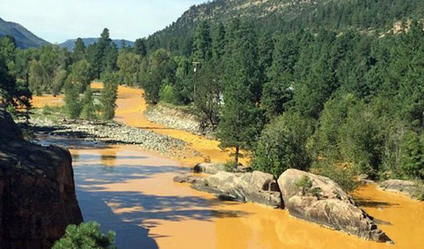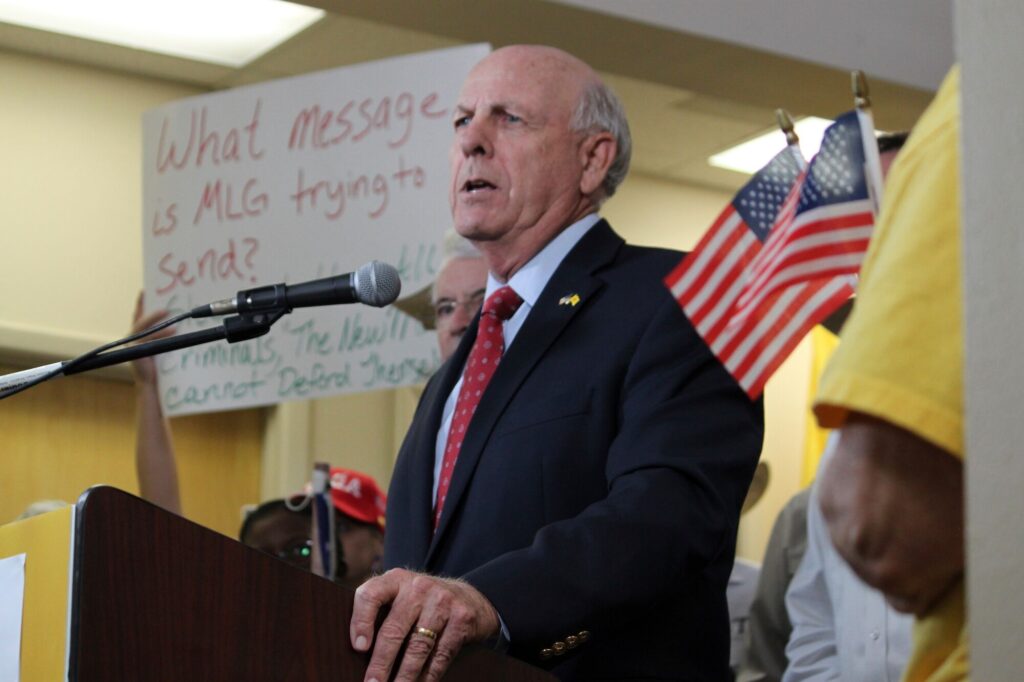Amid acrimony over abandoned mines, lawmakers float bipartisan solutions

U.S. Sens. Michael Bennet and Cory Gardner are poised to take yet another run at “Good Samaritan” legislation that would allow third parties to clean up abandoned mines without being liable under the Clean Water Act.
“Sen. Gardner and I are working to reintroduce a bill this Congress,” Bennet said in testimony Wednesday at a hearing before the Senate Committee on Environment and Public Works on the failures of the Environmental Protection Agency in the Gold King Mine spill.
Bennet last month told The Colorado Statesman he would review so-called Good Samaritan legislation in the wake of the EPA-triggered blowout of the abandoned mine near Silverton on Aug. 5 that dumped 3 million gallons of acidic mine drainage into the Animas River.
Speaking at the same hearing, chaired by Oklahoma Republican Sen. Jim Inhofe, Gardner said, “While this hearing is to examine this incident and EPA’s response, this spill shows a greater need for legislation that would allow Good Samaritans the opportunity to assist with cleaning up these abandoned mines across the West.”
Last year, Bennet and former Sen. Mark Udall co-sponsored unsuccessful Good Samaritan legislation that U.S. Rep. Scott Tipton, a Cortez Republican, took up in the House. The bill was aimed at encouraging local governments, nonprofit groups and mining companies to clean up abandoned mines like the Gold King, which number in the thousands around the West.
Democrats Bennet and Udall also worked with the EPA to establish guidance for Good Samaritans doing abandoned mine cleanup, but Bennet said Wednesday that effort “didn’t provide enough certainty and hasn’t encouraged action.”
The problem, according to some observers, is that Good Samaritan legislation by itself doesn’t come with funding to actually pay for mine cleanup, and at Wednesday’s hearing Bennet committed to once again try to secure a funding source via mining reform on public lands.
“Finally, we need to reform the 1872 Mining Law to make sure that companies pay royalties to taxpayers,” Bennet said. A bill in the House sponsored by Arizona Democratic Rep. Raúl Grijalva would impose royalties for mining on public land similar to fees paid by the coal mining and oil and gas industries, directing those funds to cleanup when necessary.
Republicans Gardner and Tipton are unlikely to support those efforts.
A Tipton spokesman told The Statesman last month the congressman, whose district includes the Gold King Mine, is solely focused on Good Samaritan legislation, and Tipton reiterated that statement last week after an EPA-themed Gold King hearing before the House Science, Space and Technology Committee, chaired by Texas Republican Rep. Lamar Smith.
Tipton said he is currently “working with community leaders and stakeholders, as well as with Colorado’s U.S. senators, toward a Good Samaritan legislative solution that stands the best chance of passing through Congress and truly addresses contamination in abandoned or inactive mines.”
Still, he made it clear the EPA is the bad guy in the Gold King debacle, blasting EPA Administrator Gina McCarthy for skipping last week’s hearing.
“This lack of transparency and elusiveness would not be tolerated by the EPA if the table was turned and a private entity had caused the spill,” Tipton said.
But Durango Mayor Dean Brookie, whose town of 18,000 is about 50 miles downstream from Silverton, told the committee the same flow of contaminants that occurred Aug. 5 has been happening every week before and since the sudden release.
“The Aug. 5 mine waste release into the Animas River put a Technicolor spotlight on the massive and complex, century-old problem that our communities have lacked the resources to address,” said Brookie, who asked the committee to “hold EPA accountable but don’t place single-agency or individual blame for a massive problem rooted in industry.”
The numerous abandoned mines in the area were created by private companies that are no longer around to pay for cleanup. EPA officials say they’ve already spent more than $8 million in taxpayer money just trying to mitigate the Gold King drainage over the years. Now Bennet and Gardner want the EPA to expedite funds for a wastewater treatment facility in the area that could cost another $20 million, according to some estimates.
“Although the EPA was working to clean up the mine, there’s no denying that they caused the spill. That’s entirely unacceptable,” Bennet said at Wednesday’s hearing. “We also need to put it in context. This has been going on for more than 130 years.”
At last week’s House hearing, the EPA’s Mathy Stanislaus said the Obama administration’s 2016 budget includes funds for the creation of an Abandoned Mines Lands program for the cleanup of abandoned hardrock mines.
“The program would be funded through a new AML fee, which would hold the hardrock mining industry responsible for the remediation of abandoned hardrock mines, just as the coal mining industry pays to reclaim abandoned coal mines,” Stanislaus told committee members.
The agency also supports reinstatement of the Polluter Pays Tax, which has been proposed by Oregon Democratic Rep. Earl Blumenauer. That tax on petroleum and chemical imports used to funnel directly into the EPA Superfund Trust Fund until Congress killed it in 1995.













